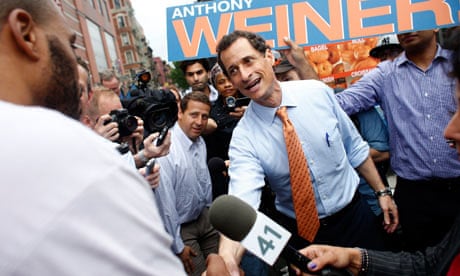Anthony Weiner has made a splash. Following a week of national headlines declaring that his campaign for New York City mayor had began disastrously, Weiner actually picked up 4pt in support. The latest Marist poll of the race has Christine Quinn as the very weak front-runner at 24%, Weiner at 19%, Bill de Blasio at 14%, Bill Thompson at 13%, John Liu at 8%, and Sal Albanese at 1%. Should no candidate reach 40% in the initial round of voting this September, the top two finishers will face each other in a runoff.
The big news, though, is that the poll greatly upsets the general consensus that Quinn is a near lock to make the runoff. Quinn is at her weakest point in the past year. The last two polls from Marist and Rasmussen have her at only 24% of the vote, with near universal name recognition. This late into the primary, that's the worst standing for the leading candidate this late since 1977, when six candidates, including powerhouses Bella Abzug, Herman Badillo, incumbent Abe Beame, Mario Cuomo, Ed Koch and Percy Sutton were vying for the nomination. A look beyond the topline indicates that Quinn has less support than even that 24%.
Quinn's favorable numbers have, if you believe Quinnipiac, been falling among Democrats all year. She had a 64% favorable rating in January, 61% in February, 52% by late April, and will likely have 50% by late May. (Note: the May poll did not ask favorables, though her favorables have been running about 10% behind her job approval rating, which was at 59% in the latest poll.) Marist has Quinn's favorables at 60%, though there isn't a baseline comparison. As last year demonstrated, different survey houses can have vastly different results when it comes to favorables. What's important to note here is that when controlling for pollsters, Quinn's favorables have been falling steadily.
More serious than just the tumbling favorables, Quinn's current support is soft. In the Marist poll, only 30% of her voters strongly support her. In contrast, 39% of the overall electorate supports some candidate strongly, meaning Quinn has unusually dispassionate support. The only candidate with softer support is Bill de Blasio. Weiner, meanwhile, who some thought was an anomaly of pure name recognition, has a far more fervent support: 43% of Weiner's voters say they are strongly behind him. Thus, while Weiner may have a low ceiling – as indicated by a 44% unfavorable rating in the Marist survey – his floor might be higher than many thought. If the contest were just among those who strongly support a candidate, Weiner actually beats Quinn, 29% to 25%.
The racial makeup of Quinn's coalition suggests she'll have further trouble. I've long argued that Quinn's coalition is a house of cards built on support from minority voters, and that the strategy doesn't make a whole lot of sense. She's undermined by her own history, as when she blocked paid sick leave for an extended period, and she's taken heat from minority groups for her position on stop-and-frisk. Quinn's largely seen as something of an heir to the mayorship of Mike Bloomberg, whose approval rating is at 49% among Democrats, but only at 42% among Latinos and 40% among African Americans. Quinn, on the other hand, scores 22% among white voters, and 31% among Latinos and 26% among African Americans.
You can actually see how minority voters are slowly dropping Quinn. Her support fell by 4pt and 2pt among Latinos and African Americans, respectively, since an April Marist survey, while her white support has held steady. It should fall further – just take a look at the Bronx. Quinn's at 32% among Bronx voters – her strongest borough. 52% of Bronx adults are Latino, and the Bronx Democratic organization has already endorsed Bill Thompson.
Indeed, I'm betting Bill Thompson will make the runoff. Per my math, a little less than half of Thompson's supporters are with him strongly – far ahead of Quinn. He's also a black candidate in a primary that is going to be near 30% African American, and New York City mayoral elections tend to break on ethnic and racial lines. It's no surprise that Anthony Weiner's strongest support comes from Jewish voters, after all. At the moment, Thompson only scores 15% among African American voters – a number that's likely wrong.
Historically, polls in New York City mayoral elections have been consistently off estimating the minority vote. In 2009, for instance, against Bloomberg in the general election, Thompson was pegged by the final polls to win anywhere from 53%-62% of black voters, and 36%-43% of Latino voters. He won 76% of the black vote and 55% of the Latino vote. The same pattern repeated itself in both the 2005 and 1997 general elections, meaning the Republican candidates had far smaller victories than the polls predicted.
Unsurprisingly, this minority polling problem has caused surveys to underestimate the performance of minority candidates in New York City's primary rounds for mayor. In 1989, final surveys had Ed Koch and David Dinkins in a tight race; Dinkins won by 8pt. In 1997, Al Sharpton trailed Ruth Messinger by 22pt; he lost by only 8pt. In 2001, Freddy Ferrer and Mark Green were in a dead heat; Ferrer got 5pt more than Green did in the first round. In 2005, Ferrer led Weiner by 5-7pt; Ferrer won by 11pt.
Bill Thompson is likely going to do better than polls suggest, and most of his untapped support is likely to come at Christine Quinn's expense. Therefore, Quinn's 24% may actually be closer to the ceiling than the floor of her support. Given that Weiner's support has been surprisingly strong, I don't expect his numbers to fall much. That means that the first round of voting could result in a near tie between Quinn, Thompson and Weiner. In that scenario, Quinn could end up with the short end of the stick, and not in the runoff at all.
